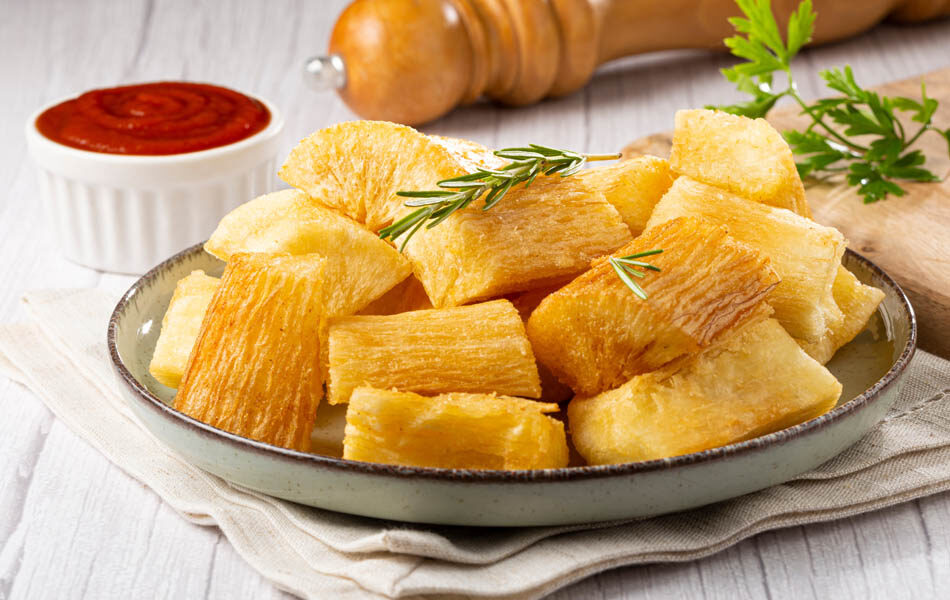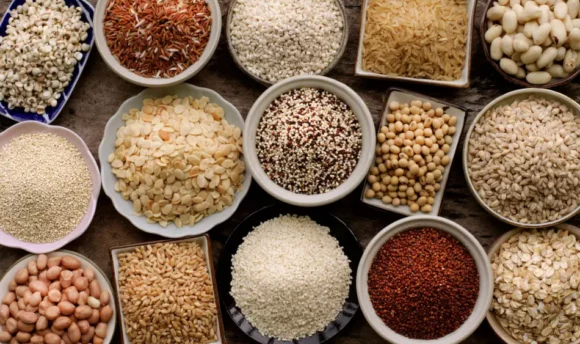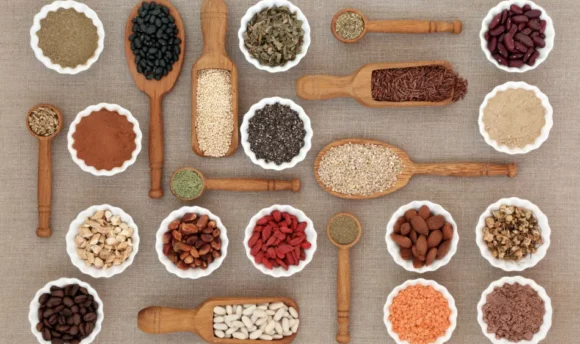Is Yuca (Cassava) Healthy? Benefits and Nutrition
Have you ever wondered about the nutrition of yuca? This article will cover health information about eating yuca and how to incorporate it into your diet.

Yuca, also known as cassava, is a nutty and starchy root veggie native to South America. Yuca is an incredibly versatile veggie that can be used in dishes like soups and stews or paired with a protein and even ground up and used as cassava flour.
Let’s talk about the potential benefits and downsides of consuming yuca root, how to prepare it safely, and nutritional information, including vitamin C.
Is Yuca (Cassava) Healthy?
Yuca, or cassava, is a healthy root vegetable that provides a good source of energy, fiber, vitamins, and minerals. However, it is very high in carbs, so it should not be eaten in excess.
5 Health Benefits of Yuca
Let’s dive into the key health benefits of yuca root:
#1 Contains resistant starch
Yuca is a source of resistant starch, a lesser-known form of carbohydrate that has many benefits to digestion, blood sugar, and more.
According to Johns Hopkins Medicine, resistant starch does not get broken down in the small intestine like usual. It is instead digested in the large intestine. This difference allows the resistant starch to ferment in the large intestine, providing good bacteria to the gastrointestinal tract.
Resistant starch helps you feel full, helps control blood sugars, lowers the risk of certain cancers, and more.
#2 Rich in fiber
Yuca also contains 2 grams of dietary fiber per 100-gram serving. According to the Mayo Clinic, dietary fiber is essential for a healthy digestive system, regular bowel movements, and more.
Dietary fiber in the diet helps support a healthy gut microbiome because fiber is a prebiotic that acts as food for the probiotic bacteria in the gastrointestinal tract.
Prebiotics and probiotics are often confused. In the case of yuca, the resistant starch creates the probiotics (the healthy bacteria that live in the gut), while the fiber provides the prebiotics (the fibrous food for the bacteria to survive on).
In other words, a diet rich in fiber is needed to feed the good bacteria in the gut.
Fiber also plays a significant role in blood sugar control. When you consume fiber with sugar (such as starchy vegetables), the sugar is digested and absorbed more slowly. This slow digestion prevents a quick rise, or spike, in blood sugar.
#3 Source of potassium
Yuca also contains potassium, a mineral that functions in fluid balance. This electrolyte works alongside sodium to maintain fluid homeostasis and hydration in the body.
According to the National Institutes of Health, potassium is passively absorbed in the small intestine for use in the body.
#4 Gluten-free
Yuca, like potatoes, is naturally gluten-free. Therefore, you can grind cooked yuca into cassava flour or purchase yuca flour as a gluten-free option if you have celiac disease, gluten intolerance, or a gluten allergy.
Other common gluten-free flours are tapioca flour and potato flour.
#5 May lower blood cholesterol
Evidence shows that yuca root may improve blood cholesterol levels. According to Johns Hopkins Medicine, the resistant starch in yuca can contribute to this effect.
The dietary fiber content can also potentially lower cholesterol, according to the Mayo Clinic.
Lower cholesterol levels can decrease the risk of heart diseases, such as heart attack and stroke.
Yuca (Cassava) Nutrition Facts
Now that we have discussed the potential health benefits, let’s talk about yuca’s nutrition.
Nutritional value (per 100g)
| Calories/Nutrient (per 100g) | Amount |
| Calories (kcal) | 160 |
| Sodium (mg) | 14 |
| Net Carbs (g) | 38.1 |
| Fiber (g) | 1.8 |
| Sugar (g) | 1.7 |
| Fats (Total) | 0.28 |
| Protein (g) | 1.36 |
| Cholesterol (mg) | 0 |
Source: https://fdc.nal.usda.gov/fdc-app.html#/food-details/169985/nutrients
Low in calories and fats
A 100-gram serving of yuca root, which is about half a cup, contains 160 calories and only 0.28 grams of fat. Therefore, the calories mainly come from the carbohydrate content.
While 160 calories may seem like a lot, the fiber and resistant starch content make this amount very filling and satisfying.
High in carbohydrates
As mentioned above, yuca root is high in resistant starch and dietary fiber, a type of carbohydrate. While 38.1 grams of carbohydrates per 100-gram serving is high, it is very nutritious in good carbohydrates.
High in vitamins and minerals
Yuca root contains many essential nutrients, such as potassium, vitamin C, and more. It has trace amounts of many other vitamins and minerals as well.
For example, vitamin C has antioxidant properties. Antioxidants protect the body from inflammation and oxidative stress.
Vitamin C also plays a huge role in immune system functioning. Your immune system protects you from disease and illness from bacteria, pathogens, and other microorganisms.
Yuca vs. Potato
While many compare the starchy yuca root to a potato, there are some key differences to discuss.
Mainly, the yuca root is starchier than the potato when cooked. Therefore, the potato contains fewer calories and carbohydrates in terms of nutrition. According to the United States Department of Agriculture, yuca and potatoes are relatively similar in fiber, protein, and fat content.
Based on a study completed by the Food Chemistry journal in 2016, potatoes also have resistant starch, meaning the carbohydrates resist digestion and act as a prebiotic, supporting a healthy gut.
Healthy Yuca (Cassava) Recipe
Have you been wondering how to prepare this delicious veggie? Let’s walk through a simple and healthy recipe for yuca.
Ingredients
- 1 pound of sliced and peeled yuca
- 3 tablespoons of extra virgin olive oil
- 2 cloves of minced garlic
- 1 teaspoon of freshly squeezed lemon juice
- 1/2 teaspoon of paprika (optional)
Directions
- Cover the yuca with water in a large saucepan.
- Bring the yuca to a boil, then cover and cook until fork-tender, which would be about 14–16 minutes.
- Drain the water.
- Toss the cooked yuca in extra virgin olive oil, lemon juice, garlic, and seasoning.
- Serve with a grilled chicken breast and brown rice, and enjoy!
It is essential to note that it is not safe to eat raw yuca root. Ensure it is fully cooked before eating and reaping the health benefits.
For more easy and healthy recipes, check out the DoFasting app! DoFasting provides thousands of recipes that are hand-picked by nutrition experts.

- 5,000+ healthy recipes
- Healthy desserts
- Improved eating habits
- Calorie tracker to track daily caloric intake
- Full guidance on successful diet
FAQs
Since yuca root is very starchy and high in carbohydrates, consuming too much can contribute to weight gain.
Yes, cassava root is an alternate name for yuca, but they both refer to the same vegetable.
There are 78.5 grams of carbohydrates in one cup of raw yuca or cassava root.
A Word From a Nutritionist
Overall, yuca is one of the nutritious and delicious root vegetables that are native to South America. It has many health benefits. It contains healthy carbohydrates, some protein, and many vitamins and minerals, such as vitamin C.
Yuca is very versatile when cooked and can be served in soups and stews. In addition, it can be eaten as a vegetable side dish, ground in cassava flour, and much more.
You can prepare frozen yuca, make mashed yuca (similar to mashed potatoes), yuca fries, and much more. In other words, yuca (as long as it is fully cooked) is an amazing root veggie to incorporate into so many of your favorite dishes!
Pair your yuca with a lean protein, such as chicken breast, beans, or sliced turkey. Additionally, add in a healthy fat source, such as avocado, nuts, or olive oil. This powerful combination will keep you feeling full and satisfied.
Additionally, a lean protein source and healthy fat, along with your fiber-rich yuca, will help the sugars absorb slowly into your blood and further prevent blood sugar spikes.
Conclusion
In conclusion, yuca is a starchy vegetable you can easily incorporate into your diet. It is naturally gluten-free and is therefore appropriate for those with celiac disease, gluten intolerance, or a gluten allergy.
Yuca is also rich in many vitamins and minerals, such as potassium, vitamin C, and more. It can even help lower your blood cholesterol levels because of the resistant starch and dietary fiber content.
Make sure you eat cooked yuca to reap the most of its benefits.

















































 Select your language:
Select your language: 








